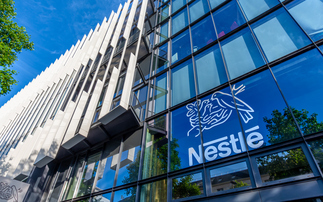Speaking ahead of next month's Global Estuaries Forum, Victor Beumer reveals how a new approach to engineering could help protect cities against climate threats
Estuaries have long played a crucial role in the history of civilisation, as the combination of fertile soils, access to fisheries, and the potential for trade links made them the ideal location for some of humanity's first settlements. Those same benevolent characteristics have extended to the modern age, with many of the world's great global cities and most populous regions located on and around estuaries, from the Nile to the Thames and New York to Tokyo, estuaries provide crucial hubs for the global economy.
However, following centuries of relative stability and security, estuaries now find themselves on the front line of the battle against climate change, as a host of escalating environmental risks pose fresh challenges to the world's great deltas. "Estuaries are really vulnerable," admits Dr Victor Beumer, a landscape ecologist and eco-engineering expert who works for the Dutch delta advisory and research body Deltares. "They will encounter some of the highest climate change pressures. You've got water coming from inland, increased rain from extreme storms, and rising sea levels. You've got water-related issues coming from three sides."
Add water pollution, air pollution, over-fishing, soil erosion and eutrophication caused by inland unsustainable agricultural practices, and the nexus of positive environmental factors that have helped to make estuaries so economically successful are suddenly in danger of being seriously disrupted. Moreover, the environmental threats faced by estuaries are likely to have serious economic impacts, as has already occurred in New Orleans and New York in recent years. "There is the potential for high-level economic impacts, because you have a lot of economic hot spots in these areas," explains Beumer. "This could be a point of vulnerability for national economies."
The precise nature of the environmental risks faced by estuaries inevitably varies immensely. As Beumer observes, in some countries the problems are related to drought conditions, while in others the primary climate-related threat comes from increased storm risks. But all deltas are facing the long-term challenge presented by rising sea levels, which by some estimates could be up to a metre higher by the end of the century, and the increased threat of lowland inundation that comes with it. Moreover, a tension is emerging between the threat presented to the industrial hubs by escalating environmental risks, and the threat posed to the environment by the pollution that continues to be released by those estuary-based industrial hubs.
However, faced with these myriad challenges, attention is turning to a new wave of potential solutions that aim to tackle estuary-related risks by harnessing some of the environmental characteristics that made estuaries so attractive in the first place. And, as ever, when it comes to managing deltas, it is the Dutch who are leading the way.
Deltares, the body formed by the Dutch government to bring together four separate agencies working on delta-related issues, has found itself in increased demand from other national governments and businesses in recent years as a result of its pioneering work with so-called eco-engineering techniques. By harnessing natural features such as sand bars, oyster reefs, reed marshes, and mud flats, Deltares has shown how replicating or supporting natural processes can reduce flood risks and slash the cost of estuary management, while also delivering economic and biodiversity benefits.
Beumer, who is scheduled to present on the merits of eco-engineering at next month's Global Estuaries Forum in in Deauville, France, is confident that a combination of economic and environmental factors are forcing policy makers and business leaders to take natural engineering techniques seriously. "Ten years ago the trend [towards eco-engineering techniques] faltered," he admitted. "But now the combination of climate change risks, the economic crisis - which means people are looking for more cost-effective solutions - and the focus on innovative solutions has resulted in more interest than ever before."
Deltares is now drawing on a growing back catalogue of case studies detailing how the creation of sand bars, oyster reefs, reed marshes, natural foreshore levees, and restored marshes are helping to reduce the flood risks faced by the Netherlands. Meanwhile, Beumer and his colleagues are taking part in an EU working group on "green infrastructure" that is seeking to assess the costs and benefits associated with eco-engineering.
Beumer counsels that few governments are likely to adopt a 100 per cent eco-engineering approach to flood protection, and nor should they. "Most countries are looking at hybrid solutions," he explains. "You have the original dyke or hard structure and you know that in 20 years it won't be able to cope with the rising sea levels and higher waves. A hybrid approach with natural solutions in front of the civil engineering reduces the need to heighten the dyke."
There are several significant benefits to this approach. Firstly, it is likely to be lower cost than a pure civil engineering project. Secondly, allowing natural habitats such as mud flats and reed beds to expand delivers substantial biodiversity benefits, which in turn can deliver economic gains through tourism or improved fisheries. Thirdly, as Beumer explains, natural engineering solutions evolve as environmental risks evolve, adapting more effectively to rising sea levels than hard engineering solutions. And finally, there is the potential for direct economic benefits, with research in both the UK and Germany currently exploring whether or not managed reed beds could provide a source of sustainable energy crops for biomass power plants.
Beumer advises that any move to harvest energy crops or oyster beds has to be carefully managed to ensure they do not compromise the flood prevention that the eco-engineering was originally intended to deliver. But he acknowledges that there are significant economic and environmental gains to be realised from this approach.
Inevitably, not everyone is convinced by the merits of eco-engineering. As Beumer acknowledges, if you have been working in civil engineering for 40 years it can be challenging to shift to such a different approach. Some conservation groups also have reservations about the unintended consequences that can result from creating new habitats.
However, as next month's Global Estuaries Forum prepares to wrestle with the network of daunting challenges faced by some of the world's most environmentally and economically important regions, it is clear that eco-engineering could hold the key to delivering the cost-effective climate adaptation that is urgently needed.
"We regard pretty much the whole of the Netherlands as a delta," admits Beumer. "We are getting to a point where [civil engineering alone] may be too costly and may not even be feasible anymore. But there are ways of using nature-based systems that give us some of the characteristics we need to cope with climate change."
BusinessGreen is a media partner of the Global Estuaries Forum










